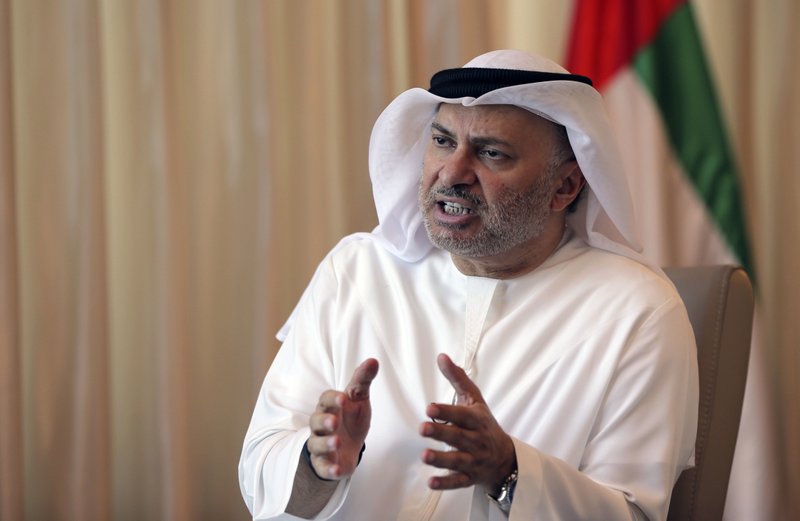DUBAI, United Arab Emirates -- A top United Arab Emirates diplomat said Wednesday that "there's nothing to negotiate" with Qatar regarding a growing diplomatic dispute about the energy-rich nation's alleged funding of terror groups, signaling that Arab countries isolating it have no plans to back down.
Anwar Gargash, the United Arab Emirates' foreign affairs minister, said in an interview that Qatar has "chosen to ride the tiger of extremism and terrorism" and needs to pay the price, despite Qatar long denying the allegation.
Gargash said Qatar "definitely" should expel members of Hamas, stop its support of terror groups "with al-Qaida DNA" around the world and rein in the many media outlets it funds, chief among them the Doha-based satellite news network Al-Jazeera.
While applauding a Kuwaiti effort to mediate the crisis, Gargash said United Arab Emirates and Saudi officials planned to concede nothing to Qatar, home to about 10,000 U.S. troops at a key U.S. military base and the host of the 2022 FIFA World Cup.
Their "fingerprints are all over the place" in terror funding, Gargash said. "Enough is enough."
Qatari officials declined to immediately comment on Gargash's comments. Its foreign minister has struck a defiant tone in interviews, even after worried residents emptied grocery stores in its capital, Doha, while Saudi Arabia blocked trucks carrying food from entering the country.
The nation's flag carrier Qatar Airways now flies increasingly over Iran and Turkey after being blocked elsewhere in the Middle East. United Arab Emirates officials shut down the airline's offices in the United Arab Emirates on Wednesday. Al-Jazeera offices also have been shut down by authorities in Saudi Arabia and Jordan. Meanwhile, Turkey's Parliament approved sending troops to an existing Turkish base in Qatar as a sign of support.
Speaking from a Foreign Ministry office in Dubai, Gargash listed a number of terror groups he says Qatar had funded, including al-Qaida's branches in Syria and Somalia, militants in Egypt's Sinai Peninsula and other groups with "al-Qaida-type organizations" in Libya. He offered no documents to support his claim, but Western officials long have accused Qatar's government of allowing or even encouraging the funding of some Sunni extremists.
Gargash pointed out the tens of millions of dollars paid to Shiite militias and others to free dozens of Qatari ruling family members and others in Iraq after 16 months in captivity.
Asked for specifics about what Arab nations wanted from Qatar, Gargash said expelling members of Hamas and other groups like the Muslim Brotherhood from Qatar was important. Gaza's Hamas rulers, which receive Qatari aid, have said Saudi Arabia's call for Qatar to cut ties with the Palestinian militant group is "regrettable" and said it contradicts traditional Arab support for the Palestinian cause.
In Germany, Saudi Foreign Minister Adel al-Jubeir said he wants to see a response from Qatar to the Arab countries' demands "soon."
Both al-Jubeir and Gargash in their comments suggested their complaints about Qatar go back years, suggesting that their grievances are focused on the policies of former leader Hamad bin Khalifa Al Thani.
Al Thani became emir through a palace coup in 1995 and expanded his nation's presence on the international scene through negotiating hostage releases, briefly engaging in diplomatic ties to Israel, hosting a Taliban office and creating Al-Jazeera.
Tamim bin Hamad Al Thani, his son, became Qatar's ruling emir in 2013, but Hamad Al Thani still looms large in the world of Qatari ruling-family politics.
President Donald Trump, who tweeted Tuesday about Qatar funding extremists, called Tamim bin Hamad Al Thani on Wednesday and offered to host leaders at the White House to resolve the crisis.
Kuwait's emir, who is trying to mediate the crisis, flew to Dubai on Wednesday and met with United Arab Emirates leaders.
The Persian Gulf countries have ordered their citizens out of Qatar and gave Qataris abroad 14 days to return home. The countries also said they would eject Qatar's diplomats.
The crisis began in part over what the Qataris described as a false news report planted during a hack of its state-run news agency in late May. Russia denied Wednesday that it hacked the agency after a CNN report quoted anonymous U.S. officials saying they suspected Russian hackers. FBI agents are assisting Qatar in its investigation, said Meshal bin Hamad Al Thani, Qatar's ambassador to the U.S.
The UAE did not hack the Qatari news agency, Gargash said. However, he did acknowledge the authenticity of recently leaked emails from United Arab Emirates Ambassador Yousef al-Otaiba in Washington, which several media outlets described as including criticism of Qatar.
"That hack showed the UAE's real concerns and that what we really say in our private emails is what we say publicly," Gargash said.
Information for this article was contributed by Geir Moulson, Karin Laub, Josh Lederman and Fay Abuelgasim of The Associated Press.
A Section on 06/08/2017
